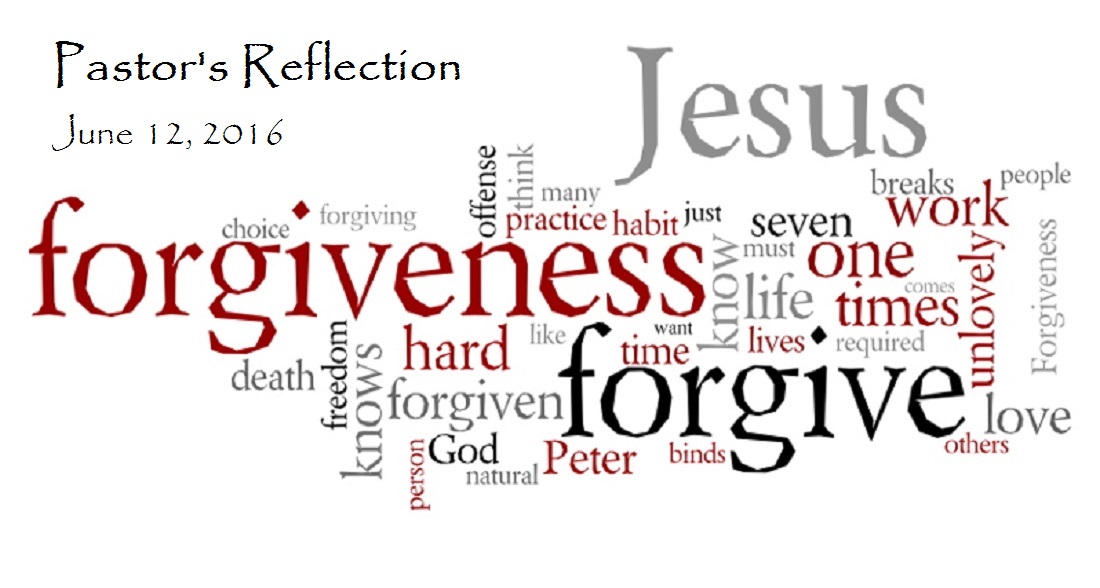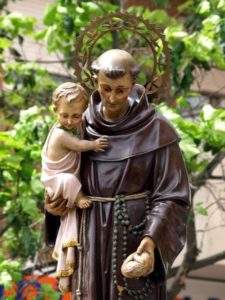St. Mary's Basilica
Phoenix, Arizona
Pastor’s Reflection

Wholly Forgiveness
“Love, therefore the Lord your God, who made you and made himself your servant.
He gave himself totally to you, so that you might give yourself wholly to him.”
Saint Anthony of Padua
An old story I collected from somewhere. Two sweethearts walked hand in hand on the river-walk in downtown San Antonio. Both knew that their relationship was deepening and growing stronger day by day. On that day in particular, they were musing about their future together and how they might deal with the inevitable problems and disagreements that arise in any relationship. They conversed on a variety of possible scenarios including faith preference, cultural background, children (yes or no? how many?), political views, money issues, etc.
At one point in their conversation, she turned to him and asked very tentatively, “Could you forgive me if I were unfaithful?” She was shocked by how quickly he replied, “Of course, I would. I love you too much not to!” This quality of forgiveness is highlighted in the Church’s liturgy this weekend. Each of the three sacred texts offers reassurance to sinners that God cannot help but forgive. Why? Because “God, who is Love, loves us too much not to.” (Loving Forgiveness by Patricia Datchuck Sanchez, Celebration, June 2016) Sounds like my favorite Franciscan miracle worker, Anthony of Padua.
 The original icon after his canonization a year after his death, showed him with flames in his hands. He was a fiery preacher of the love of God. Like St. Francis he spent much of his “wandering around Italy time” trying to reconcile warring aristocratic houses. “Be praised my Lord for those who give pardon for love of you…” they sang. Many times Anthony failed, including one preceding his death in 1231. It is said he climbed a walnut tree and in his frustration started throwing walnuts at passersby. I imagine him laughing uproariously as people swatted at what they thought were just pesky flies. Our grudge holding is often like that. Pardoning for love of him is when we are most like God.
The original icon after his canonization a year after his death, showed him with flames in his hands. He was a fiery preacher of the love of God. Like St. Francis he spent much of his “wandering around Italy time” trying to reconcile warring aristocratic houses. “Be praised my Lord for those who give pardon for love of you…” they sang. Many times Anthony failed, including one preceding his death in 1231. It is said he climbed a walnut tree and in his frustration started throwing walnuts at passersby. I imagine him laughing uproariously as people swatted at what they thought were just pesky flies. Our grudge holding is often like that. Pardoning for love of him is when we are most like God.
Jesus ignores all the complaints about the sinful woman in the Gospel story from Luke. All he saw was the devotion of one considered beyond the mercy of God by his host Simon the Pharisee. He saw the broken alabaster jar of ointment, the bathing of his feet with tears, the drying with her hair. “Much is forgiven of one who loves much,” He said. We pray to be a community transformed from being stingy Pharisees into lavish lovers, especially for the lost. Saint Anthony became the saint who recovers lost things. A magazine with his name on it published a “Litany of the Lost” a few years back. I identify with some of its categories.
Lord, have mercy on us. For those who have lost: our health, our peace of mind, our housing, our financial security, a loved one, our dreams, our talents, our initial zeal, our sobriety, our faith, our self respect, our perspective, our innocence, our independence, peace within our families, civil peace, our trust in others, our virtue, our home or freedom, our reputations, our sanity and serenity, our ability to love, Saint Anthony pray for us.
A gentle week,
Fr. Michael Weldon, OFM
